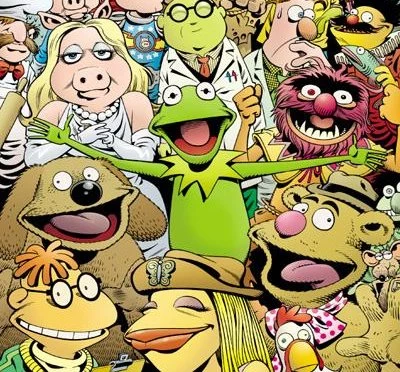
Digital December: Boom! Studios on the ‘Pollyanna-ish’ Overhype of Digital Comics

Boom! Studios has kicked their entire operation up a notch over the past few years. Mark Waid's Incorruptible and Irredeemable are critical darlings, their Disney books have captured an audience that a lot of mainstream comics cannot, and they've even revived well-loved franchises like the Muppets and Darkwing Duck to great effect. They've also been quietly taking the lead into the digital space ahead of other major publishers, with the vast majority of their backlist being available digitally right from the start. We spoke with Chip Mosher, Marketing Director at Boom! Studios, about his company's digital plans.ComicsAlliance: Just to start from the beginning and provide a foundation for this interview, how long has Boom! Studios been producing digital comics?
Chip Mosher: Well, I guess that depends on what you mean by "digital comics." When I first came to BOOM! as the Marketing Director in July of 2007, we all really saw the internet as a great way to reach out to new readers and help build the business. So in January of 2008, we did the first day-and-date print and digital release of a comic with our North Wind mini-series on MySpace Comics and out in retail comic stores on the same day. We did it again the next year with another mini-series, Hexed. When we launched our website several years ago, we offered 6 of our trades up as page-a-day webcomics, which performed very well for us.
If you are just talking about comics for sale digitally through different mobile devices and the web... then BOOM! was one of the first companies to have comics available on the iPhone with iVerse, when they launched. We had the first comic book available to download on the Android system with Hexed #1. Then, there was a time when a ton of players came on board, especially when the iPhone App Store started accepting in app purchases, where we took a step back and waited for the market to shake out. And then when we felt the market was getting to a point where we wanted to dive in head first and go whole hog, spread eagle on the thing, this past May we released our iPad/iPhone/iOS app (about a month or so after Marvel did) and then partnered with Comixology, iVerse, Graphic.ly and Panelfly to carry our entire front list and back list of BOOM! Studios titles. Mydigitalcomics.com has been added to that list since. And we have a ton of new initiatives in the pipeline. So I think you could safely say we were and have been very aggressive in the space.
CA: Generally, how have digital comics performed in the marketplace for Boom? Have there been any series which were surprise hits in digital form that just sold on par in print?
CM: The biggest surprise to me has been that 40% of our sales came from outside the United States. That was pretty amazing when I first saw it. But, you know what? When I came to BOOM! back in the day and there was just a handful of people and a handful of books, the most active place of BOOM! fandom was the forum in France on Superpouvoir. So, once I thought about it, it made more sense. There is a huge hunger internationally for American comics in the original language, and from talking to other publishers on panels about digital comics, that 40% number runs across most publishers that are in the space as aggressively as we are. Outside of that surprise, Irredeemable has been our big hit in print. It is our big hit in the direct market, in the mass market, and also in the digital market. So, no surprises there!
CA: Direct Market shops generally service a certain demographic and bookstores service a somewhat more mainstream demographic. Have digital comics sales aligned with one or the other? Have comics that traditionally do not work as well in one market or the other, such as children's comics or novel adaptations, sold well digitally?
CM: I actually don't know if I agree with you about bookstores being a more mainstream demographic. I see that most Barnes and Noble and Borders stores I go to have a majority selection of the Big Two than they do of independent titles, just like the majority of the Direct Market. So, what is your definition of mainstream? But, hey, I might be picking nits. Some of our original BOOM! Studios titles perform pretty great, like Codebreakers really performs well digitally relative to Irredeemable digitally, especially given the difference in their print sales in the [direct market].

CA: How do you go about choosing which series get converted to digital comics first? How do you decide how far behind the print release the digital comics release should lag?
CM: Part of our launch this year on the iPad/iPhone and with our five digital partners was a commitment to have our entire BOOM! Studios backlist and most of our front list available. And we have done that. We currently have at least a 30 day window on much of our front list. Sometimes that decision is more up to our partners' bandwidth in processing the books than to us internally.
CA: Boom! has a strong line-up of original works and licensed content. Boom!'s selection on ComiXology accurately reflects that diversity of content, but there's a notable lack of anything Muppet or Disney-related available digitally. Is this due to rights negotiations?
CM: Disney (which owns the Muppets) has their own digital comics initiative called Disney Digicomics. That is where they are releasing their licensed comics content including the content we have generated.

CA: Does having a catalog of original and licensed works provide any unique challenges or benefits when it comes to digital comics?
CM: Obviously, I think that over the long haul licensed titles, so-called "branded entertainment," are going to perform better to the casual digital comics buyer because of brand name recognition. We are still in the early stages here and I think it is premature to make any sweeping judgments, but it will be interesting to see if licensed comics become the dominant sellers.
CA: In terms of the digital comics reading experience as it currently stands, comics are generally stored on the cloud and are inaccessible for anything but reading. How do traditional ideas of ownership, whether that means the ability to legally transfer a work to another machine or simply having the ability to have a comic book stored on your desktop, factor into your plans?
CM: I'm pretty stoked with the eco-system that Comixology has right now. You can go to comics.comixology.com and buy a comic and read it right on their website. Then that comic, if it is a BOOM! title, will come up in the BOOM! Studios Comics App on the iPad, iPhone or iPod Touch. (I know I should just say iOS devices, but that doesn't sound as cool!) And, of course, that title will also come up on Comixology's own Comics app also. Graphic.ly just launched their HTML5 web store, which I think has the same eco-system now... Honestly, I think casual readers don't care about ownership etc. and the hardcore collectors are going to be buying print anyway. Would it be nice if you could transfer a file format between Comixology and iVerse and Panelfly and Graphic.ly and My Digital Comics? Sure, that would be swell. But we are just in the beginning of this market and I expect that these issues will eventually work out as time goes by.
CA: The eventual trade paperback or hardcover collection of monthly comics is almost a given these days. In the realm of digital comics, however, the monthly pamphlet format is the norm. Will you be exploring bundles of comics, perhaps at a reduced price? Do you have reason to believe that there's even a market for bundled comics or digital-only releases?
CM: As I said before, we are just at the beginning of the creation of a viable digital marketplace for comics. One thing that concerns me is that we have completely replicated the periodical market digitally and I don't know if casual readers are going to cotton to periodical comics. Reading 22-page ongoing stories on a month-to-month basis is a pretty weird thing to do. There are not a ton of analogues to this anymore. The closest is serialized television on TV on a week to week basis. People on the internet want instant gratification -- the medium is the message -- and when I can get any question I can ever come up with answered within seconds on Google, but then have to wait 30 days for the next issue of a comic... For a casual reader with absolutely no exposure to comics, I just don't know how well periodicals -- as we know it in print -- are going to do in the long run online. So if I can gaze into my crystal ball, I see a ton of experimentation. Maybe some hybrid page-a-day webcomic models. Weekly releases. More trades with complete story lines for sale. Things of that nature.
We haven't put any trades up, so I don't know how well they would do. The Walking Dead volumes are up for sale. I'd love to know how they are selling. So here's your next assignment, David: Go ask Kirkman for me!

CA: Boom! has a pretty impressive library of books across a variety of online publishers. What benefit does partnering with a number of online distributors have over having a single, and perhaps proprietary, Boom! digital comics app?
CM: We didn't want to dictate to people where they had to buy our comics and, also, to be frank, we're not a company to put all our eggs in one basket. We have our BOOM! Studios App on the iPad/iPhone/iPod Touch and we have content available with all the main players. Just like Diamond and Haven distribute our print publications to the Direct Market. Simon and Schuster and HarperCollinsCanada distribute us in the U.S. and Canada, respectively. And, we also have Kable that does our newsstand distribution. So we always try and diversify.
CA: Where and how comics are sold has a habit of creating massive change in the comics industry. The rise of the Direct Market helped change how comics were consumed and who they were sold to. Speculators in the '90s depended on scarcity and conjecture to turn a fast buck. How do you see the advent of easy to attain and affordable digital comics affecting the comics industry?
CM: Right now, the best estimates I've gotten are that we have about 300,000 people reading comics in the Direct Market on a month-to-month basis. I think everyone is so wrapped up that we can now reach the other 99% of the U.S. population easier than we ever have been before, that they are missing that we still have a ton of issues to work through. Being a guy whose main currency is hype, the hype on digital comics is pretty astounding and, at least for me, has crossed the line into being counter-productive.
It seems to me, that everyone sees "digital comics" as having this massive change on the industry. "Digital is going to save comics." Every 5 to 10 years, something comes by that is going to "save comics." Trades were going to "save comics" before digital. The mass market was also going to "save comics." To put it simply, this is a very Pollyanna-ish view.
And let me turn the tables on you here, David. You say, "easy to attain." I really think the fact that comics now have the potential to be easier to obtain is great. But that does not get rid of the challenges that we have had with getting new readers for the past 30 years! The challenges are now different, and in some case less challenging than before, but to me they seem oddly the same!
Now I love all my digital comics partners, and think that BOOM! is doing a kick-ass job in the digital space, but let me put my "Debbie Downer" hat on here for a minute. I mean, how easy, is it really, to get these comics for new readers? Let me throw some scenarios and questions to you, okay? You have a mobile device, to read a comic you have to search for it. How do people search for comics? What comes up in that search? Let's take an example, right now what are the first 5 Apps that come up when you search for "comics?"
[Ed. note: Comixology's Comics, iVerse's Comics +, DC Comics, Pocket God Comics (a videogame tie-in), and Marvel Comics as of 12/15/10.]
How does that effect the marketplace in the future? What mechanisms are there for bringing casual readers back once they experience reading a comic? Will continuity heavy content from the Big Two have to change to expand the marketplace?
Getting new readers into comics is something that we are horrible at as an industry. I love Free Comic Book Day, and it is a spectacular event, but there is nothing we have that helps explain to people that we have new comics every week. New stories every month. We all assume that people know how to read periodical comics, whether print or digital, and let me just use a big word here, those are fallacious assumptions! We need to dig deeper right now than just seeing digital as the panacea to all of the comic book industry's problems.
Look, I am a marketing guy. So I have always seen getting new readers as a marketing problem. So... great, now there is the potential to get comics anywhere you have a computer or a mobile device! Awesome. Okay, how do we get more people to read comics? There currently is not as big a demand as any of us in the industry feel their should be. But just because digital comics are available outside the Direct Market doesn't mean there is going to be an instant demand that just magically appears. We need to build that -- both for print and digital.
I'd love to have super deep enough pockets to hire one of the big ad agencies and put together a campaign to re-introduce periodical comics to the American public - that would be just a complete kick. But realistically, I don't see that happening. Now that doesn't mean BOOM! does not have some tricks up our sleeve. Next year is going to be big for us. In print and digital! I'd spill it now... but that wouldn't be any fun. (Did you notice my "Debbie Downer" hat just fell off?)

More From ComicsAlliance

![Ryan K. Lindsay Grabs ‘Deer Editor’ by the Horns [Back Pages]](http://townsquare.media/site/622/files/2016/08/deereditor-fea.png?w=980&q=75)





![Comics Your Cares Away: Kate Leth And Jake Myler Talk ‘Fraggle Rock: Journey To The Everspring’ [Interview]](http://townsquare.media/site/622/files/2014/11/fraggle1-hed.jpg?w=980&q=75)

